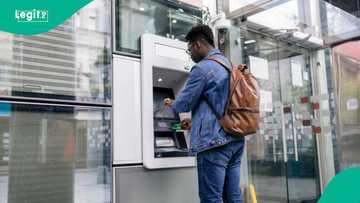Naira Crashes: CBN Sells $580 Million to Banks, Authorised Dealers in FX Markets
- The Central Bank of Nigeria (CBN) pumped about $580 million into the foreign exchange market to prop up the naira’s value
- The development affected Nigeria’s external reserves, which declined to $38.045 billion in May due to aggressive FX market interventions
- The CBN’s interventions supported the naira’s appreciation against the US dollar in the forex market
Legit.ng’s Pascal Oparada has reported on tech, energy, stocks, investment and the economy for over a decade.
The Central Bank of Nigeria (CBN) injected about $580 million into the local foreign exchange market in May to defend the naira.
Data showed Nigeria’s gross external reserves declined to $38.045 billion in May, showing the apex bank’s aggressive intervention in the FX markets.

Source: Twitter
CBN’s interventions prop up the naira’s value
The intervention supported the local currency’s rally but raised concerns over long-term sustainability and a negative effect on reserves.
To ensure the naira’s stability amid rising demand for dollars for foreign payments, the apex bank has continued to sell forex to authorised dealer banks.
According to AIICO Capital Limited, in May 2025, the FX market traded with volatility but was relatively stable, supported by continued interventions and improved liquidity.
Experts disclosed that in early May, falling oil prices and continued FX demand pushed the naira to an intraday high of N1,614 per dollar, but due to subsequent interventions of about $580 million, the FX market moderated.
Nigeria’s rating improves
The move was buoyed by improved confidence, which showed the sovereign rating upgrades.
MarketForces Africa reported that Moody’s Investors Service upgraded Nigeria’s sovereign credit rating from Caa1 to B3 with a stable outlook, marking a second positive rating action under the current government.
The Moody’s rating showed substantial improvements in fiscal and external positions, caused by key reforms including fuel subsidy removal, exchange rate unification, and enhanced tax revenue collection.
The naira’s value rises in May
The company also increased Nigeria’s naira ceiling to Baa2 and foreign ceiling to B2, acknowledging CBN’s increased FX reserves and reduced fiscal pressures.
The US greenback was sold at N1,575 and N1,610 per dollar in May, analysts say.
According to reports, the naira rose by 66 basis points monthly appreciation to N586.15 per dollar in May, while the black market depreciated by N11, closing the month at N1,617 per dollar. The development showed persistent street demand.
Reports say that while demand spikes tested the naira, enhanced market confidence and robust liquidity conditions kept the naira anchored.
Nigeria fully settles the IMF debt
Legit.ng reported that Nigeria achieved a milestone in external debt management by fully settling its outstanding obligations to the International Monetary Fund (IMF), removing the country from the debtor list.
The IMF debt was reduced from $3.54 billion in December 2020 to complete repayment by May 2025.
The achievement coincided with improvements in FX reserves, which rose by $364 million between April 30 and May 14, 2025, representing a two-week upward trend since January.
The external reserves received another inflow from the International Money Transfer Operators (IMTOs), which hit 44.5% to $4.76 billion in 2024 from $3.30 billion in 2023.

Source: Getty Images
Dollar Inflow Surges by 62% to $5.96bn
Legit.ng earlier reported that Foreign exchange inflows into Nigeria rose by 62% per month to $5.96 billion in May 2025, as the Nigerian currency, the naira, appreciated N551 per dollar due to renewed investor confidence and robust domestic participation in the FX market.
FMDQ data indicated that the increase, which rose from $3.67 billion in April, was caused by a significant increase in contributions from local sources, which accounted for 83.2%.
Domestic inflows rose to a six-year high of 64.2% to $4.96 billion, driven by increased activities from exporters and importers, non-bank corporates and individuals.
Proofreading by Kola Muhammed, copy editor at Legit.ng.
Source: Legit.ng





